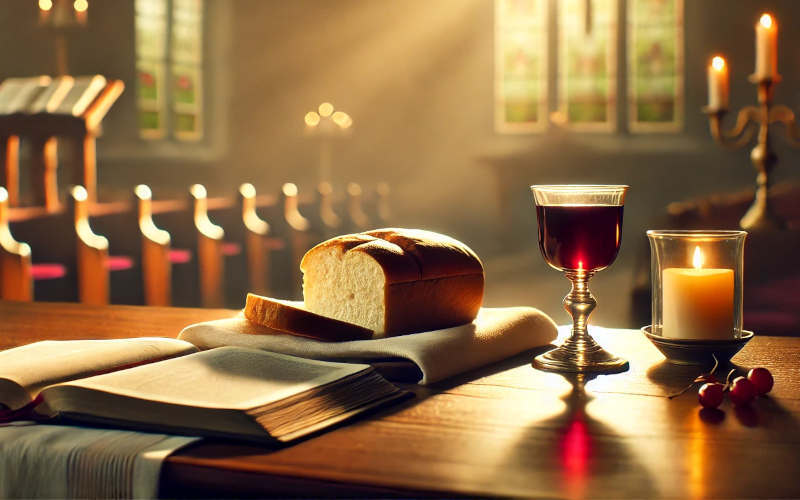One Loaf, One Body: The Unity in Christ

Familiar Words, Deeper Meaning
How often do we find ourselves reciting hymns, scriptures, and prayers by heart, words so familiar that they roll off our tongues without a second thought? Consider this: if I began with "For God so loved the world," I imagine most of you could effortlessly complete the verse, "that he gave his only begotten son, that whosoever believeth in him should not perish, but have everlasting life."
But what if I asked you to pause and really think about those words? What if I challenged you to reflect on what they truly mean, beyond the familiarity? Today, I want us to embark on a similar exercise, but with the words of Jesus at the Last Supper: "This is my body."
These words, spoken by our Lord, are at the heart of our communion tradition, yet they’re so often repeated that their significance might be overlooked. Have we, perhaps, become so accustomed to hearing them that we miss their true meaning? Do we understand what Jesus was truly offering when he broke that bread and passed it to his disciples?
Today, let's take a step back and reconsider these words, peeling away the layers of routine to uncover the rich, spiritual depth they hold. As we delve into the scriptures and reflect on what it means to partake of Christ’s body, may we gain a renewed appreciation for the sacred act of communion and the unity it signifies for us as believers.
The Words of Institution: An Examination
As we reflect on the words "This is my body," it's crucial to delve into the scriptures to fully understand their meaning. In the Gospels, we find accounts of the Last Supper where Jesus shares bread with his disciples, yet each account offers a slightly different perspective. Matthew 26:26 tells us, "And as they were eating, Jesus took bread, and blessed it, and brake it, and gave it to the disciples, and said, Take, eat; this is my body." Similarly, Mark’s Gospel mirrors this account almost word for word.
However, when we turn to Luke 22:19, we notice an addition: "And he took bread, and gave thanks, and brake it, and gave unto them, saying, This is my body which is given for you: this do in remembrance of me." Here, the phrase "which is given for you" adds a layer of meaning, emphasizing the sacrificial nature of what Jesus was about to endure. Yet, it’s in 1 Corinthians 11:24 that Paul, recounting the event, includes a variation found in some translations: "This is my body, which is broken for you."
The question arises: Was Christ’s body literally broken? The Gospel of John explicitly says that not a bone of his body was broken, fulfilling the prophecy that none of his bones would be broken (John 19:36). This detail forces us to consider whether the word "broken" refers not to Christ's physical body, but rather to the symbolic act of breaking bread.
The various translations and manuscript traditions reveal that the word "broken" might not have been in the original text, as most modern versions like the NIV and ESV omit it. Instead, they convey, "This is my body, which is for you." This slight shift in wording refocuses our understanding away from the idea of Christ’s body being physically broken, directing us instead toward the concept of the bread—broken and shared—as a symbol of Christ’s sacrifice.
Thus, we are called to reflect on what Jesus intended with these words. Was he emphasizing the physical breaking of his body, or was he drawing our attention to the act of sharing—of giving himself entirely for us, symbolized by the bread? This examination challenges us to deepen our understanding and reverence for the words we recite during communion, realizing that they point to the unity and sacrifice we share in Christ.
The Symbolism of Breaking Bread
The act of breaking bread during the Last Supper was deeply symbolic, steeped in the rich tradition of Jewish communal meals. In the culture of Jesus' time, bread was a staple of life, a symbol of sustenance and provision. To break bread together was more than just sharing a meal; it was a profound act of fellowship and unity. When Jesus broke the bread at the Last Supper and said, "This is my body," he was using a familiar, everyday action to convey an extraordinary spiritual truth.
Throughout the New Testament, the phrase "breaking bread" is consistently used to signify not just a physical meal but a communal, spiritual experience. In the early church, believers gathered regularly to "break bread" together, as we see in Acts 2:42: "They devoted themselves to the apostles’ teaching and to fellowship, to the breaking of bread and to prayer." This breaking of bread was both a literal and symbolic act, representing the believers' unity in Christ.
But what did Jesus mean when he associated the broken bread with his body? By breaking the bread, Jesus was not just distributing food; he was sharing himself. The bread, broken and given, stood for his body, which would be offered up on the cross. Yet, it’s crucial to note that this act was not about the physical breaking of his body, as no bones were broken. Instead, it symbolized the giving of his life, his very self, for the salvation of humanity.
This symbolism extends further when we consider the communal aspect of the act. When we break bread together in communion, we are not just remembering Christ's sacrifice; we are taking part in it. The bread, broken and shared among many, symbolizes the unity of believers in the body of Christ. Just as many grains come together to form one loaf, so do we, though many, become one body in Christ.
Therefore, the breaking of bread is a reminder that we are called to be united as one in Christ. It’s a call to fellowship, to share in each other’s lives, and to recognize that we are all part of the same body. This simple act of breaking and sharing bread serves as a powerful symbol of the self-giving love of Christ and the unity we are meant to embody as his followers. As we partake in this sacred act, we are reminded that, just as the bread is broken and shared, so too are we called to share our lives with one another in the love and unity of Christ.
Unity in the Body of Christ
In the act of breaking bread, we find a symbol of the unity we are called to embody as the body of Christ. The Apostle Paul, writing to the Corinthians, emphasizes this unity in 1 Corinthians 10:16-17: "The cup of blessing that we bless, is it not a participation in the blood of Christ? The bread that we break, is it not a participation in the body of Christ? Because there is one loaf, we, who are many, are one body, for we all share the one loaf."
Paul’s words remind us that the bread we break in communion is more than just a symbol; it is a participation in the body of Christ. This act of sharing a single loaf represents the oneness we have in Christ. No matter our differences—be they cultural, social, or personal—we are united as one body because we all partake of the same bread, which symbolizes Christ’s body given for us.
This unity is not just a nice idea; it is essential to our witness as followers of Christ. Jesus himself prayed for this unity in John 17:21: "That they may all be one, just as you, Father, are in me, and I in you, that they also may be in us, so that the world may believe that you have sent me." Our unity as the body of Christ is a testimony to the world of God’s love and the truth of the gospel.
Living out this unity requires humility, patience, and a commitment to love one another as Christ has loved us. It means setting aside our personal preferences and agendas and prioritizing the common good of the body. It means recognizing that every member of the body is valuable and that we need each other to function as Christ intended.
As we gather to break bread, let us remember that we are taking part in something much larger than ourselves. We are reaffirming our commitment to Christ and to each other as members of his body. Let us strive to keep the unity of the Spirit in the bond of peace (Ephesians 4:3), so that we may truly be one loaf, one body, as Christ intended.
Avoiding Division: Lessons from Corinth
The divisions in the Corinthian church serve as a sobering reminder of how easily the body of Christ can be fractured by pride and factionalism. In 1 Corinthians, Paul addresses the troubling reality that the believers were aligning themselves with different leaders, saying, "I follow Paul," or "I follow Apollos," or "I follow Cephas," or even "I follow Christ" (1 Corinthians 1:12). These divisions were not just a matter of personal preference; they were tearing the church apart and undermining the unity that should define the body of Christ.
Paul’s rebuke to the Corinthians is clear: Christ is not divided, and neither should his body, the church, be. By creating factions, the Corinthians were behaving no differently than the world around them, where power struggles and rivalries were the norm. But in the body of Christ, we are called to a higher standard. We are called to unity, to be one as Christ and the Father are one.
In our contemporary context, the dangers of division are just as real. Whether through denominational differences, doctrinal disputes, or personal conflicts, we risk repeating the mistakes of the Corinthians if we allow these issues to create rifts in the church. The breaking of bread during communion reminds us that we are all part of one body, united in Christ. It challenges us to set aside our differences and focus on what unites us: our shared faith in Jesus and our commitment to follow him.
To avoid the pitfalls of division, we must be vigilant in guarding the unity of the Spirit. This means resisting the temptation to elevate our personal preferences or align ourselves with particular leaders in a way that excludes others. Instead, we should strive to keep the unity of the body, recognizing that we are all members of one another, called to work together for the glory of God.
Let us learn from the mistakes of the Corinthians and commit to fostering unity within the church. By doing so, we honour Christ and show to the world that we are truly his disciples.
The Communion of the Body of Christ
Communion, or the Lord's Supper, is not just a ritual we observe; it is a deep expression of our unity in Christ. When we gather to break bread together, we are taking part in something sacred—a communal act that symbolizes our shared faith and our collective identity as the body of Christ.
This act of communion is a reminder that we are not just individuals in isolation but members of a larger body, connected through our faith in Jesus. The bread we break and the cup we share are tangible symbols of the spiritual reality that we are united in Christ. This unity rises above all barriers—be they cultural, social, or personal—and calls us to live in harmony with one another.
Communion is also an invitation to mutual care and service. As we partake of the bread and the cup, we are reminded of Christ's self-giving love, and we are called to reflect that love in our relationships with each other. This means looking out for one another, meeting each other's needs, and supporting each other in times of difficulty. It’s a call to move beyond superficial connections and enter into deep, meaningful fellowship, where we bear one another's burdens and rejoice together in our shared faith.
The importance of gathering together for communion cannot be overstated. While personal devotion is vital, communion is meant to be experienced in community. It’s an act that unites us with Christ and with each other, reinforcing the bond we share as members of his body. To take communion in isolation, when it is possible to do so with others, misses the essence of this sacred meal. It is in the coming together, in the breaking of bread as one body, that we fully realize the significance of what Christ has done for us and what he calls us to be.
Let us, therefore, approach communion with a renewed sense of its importance—not just as a ritual, but as a powerful declaration of our unity in Christ. As we break bread together, may we be reminded that we are part of something much greater than ourselves—a community of believers, united in love and purpose, called to live out the gospel in our daily lives.
The Unbroken Body of Christ
As we reflect on the act of breaking bread, let us remember that it symbolizes more than just the sacrifice of Christ—it represents the unity of his body, the church. When we partake of communion, we are not merely remembering Christ’s death, but we are also affirming our commitment to one another as members of his body. The bread we break may be divided among us, but it unites us as one in Christ.
This unity is essential. It is a witness to the world of the love and grace that Christ offers to all. Jesus prayed that his followers would be one, just as he and the Father are one (John 17:21). Our unity is not just a spiritual ideal; it is a tangible reality that we are called to live out daily. By coming together in communion, we declare that we are one loaf, one body, united in Christ.
Let us carry this unity with us. Let it shape how we interact with each other, how we serve, and how we live out our faith. Let us be mindful that we are all part of the same body, each of us essential to the whole. When we gather again to break bread, may we do so with hearts full of gratitude for the unbroken body of Christ and a renewed commitment to keep the unity of the Spirit in the bond of peace.
In Christ, we are one body—many parts, but one loaf. Let us live in that unity, honouring the sacrifice that made us whole.


